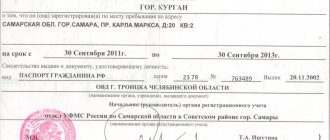Determining the place of residence of migrants
Migrants are people who changed their place of residence due to various circumstances and by decision of government agencies. Resettlement can be carried out under an agreement with government agencies in order to populate remote regions of the country.
The law provides for a special status for internally displaced persons. These are people who were forced to leave their place of residence, while having Russian citizenship, due to any circumstances that pose a danger to the person or members of his family. These people receive certificates confirming their status and are given the right to freely choose their place of residence in the country. They also retain the rights to forcedly abandoned residence.
Thus, the question of the correct spelling of the word forms “residence” and “place of residence” in some cases depends on the specific context in which they are used. But it is worth remembering that it is correct to use both forms of these words.
WHAT IS IMPORTANT TO KNOW ABOUT THE NEW PENSIONS BILL
After receiving the payment case, an order is issued to register it and extend the payment of the pension at the new place of residence no later than two working days from the date of its receipt. At the same time, the correctness of establishing the pension at the previous place of residence is checked on the basis of the documents of the payment file.
We recommend reading: Benefits for a young family to buy a home
Yes, you should also request a payment file in connection with a move if you received a pension on a bank card account at your previous place of residence. The fact is that the payment file contains all the necessary information that you and the Pension Fund employee at your new place of residence may need. For example, to recalculate the amount of a pension.
Deregistration at previous place of residence
This registration measure is subject to Order of the Federal Migration Service of the Russian Federation dated September 11, 2012 N 288, paragraph 135.
Algorithm
The procedure for a citizen before his departure to a new permanent residence address is as follows:
- come to the official authorized to carry out accounting measures, or directly to the FMS office, or to the MFC;
- fill out the necessary paperwork;
- receive the result of termination of permanent registration and a departure certificate.
If you make an appointment in advance, the loss of time will be minimal.
Documentation
The only documents you need to take with you are your passport, and an application with a request to terminate registration at the old address, which does not require a special form, in free style, can be written at home, or you can also write it on the premises of the body authorized to provide such services, using the sample on the board in room for visitors.
It is important to know that each adult family member writes such a statement on his own behalf, and a visit to the authorities must be made by each of those moving - in person, and with his own identity card.
You will need to provide a detailed address of your new permanent location. The departure form must be filled out by a service employee.
The result of the procedure is the affixing of a deregistration stamp in the passport of the departing citizen indicating the date, and the period for providing the service is 3 days from the date of receipt of the application by the migration service.
Is it possible to submit an application and a copy of your passport by post or through the State Services portal? Yes, this is possible, only then you will still have to appear in person with the original papers. In these cases, the service period will be extended for another 3 days.
This method of canceling registration is an extra link in the chain of communication with registration authorities: in a hurry to deregister, a person may not have time to meet the 7-day period allowed for registration at a new address.
How to sell an apartment in common shared ownership without problems and troubles. You can find out what mortgage lending conditions Sberbank provides in our article. You can read how much a home appraisal for a mortgage costs by following the link.
Residence address
". 2) address of residence - address (name of a subject of the Russian Federation, district, city, other populated area, street, house and apartment number) at which a citizen of the Russian Federation is registered at the place of residence in the registration authorities of citizens of the Russian Federation at the place of stay and at place of residence within the Russian Federation and which is contained in the mark on registration of the citizen at the place of residence in the passport or document replacing the citizen’s passport;. "
Place of residence of an individual - address (name of a subject of the Russian Federation, district, city, other populated area, street, house number, apartment) at which the individual is registered at the place of residence in the manner established by the legislation of the Russian Federation... ... Official terminology
We recommend reading: Where to get snils for a child in Penza
If there is no reason to obtain the right to permanent residence?
How else can you get a residence permit in the Russian Federation?
If no program is suitable, then there is the right of legalization in the Russian Federation. The process is longer, however, with the same result. To do this you need:
- have a migration card;
- no later than seven days from the date of arrival in the locality, register for migration;
- obtain a TRP (temporary residence permit). Such a permit is issued for three years, but it must be obtained within 90 days, allowed by migration registration (30 days for citizens of the countries of the Eurasian Union). However, you cannot leave the country during this time.
- after receiving a temporary residence permit, one year after the permit is valid, it is necessary to obtain a residence permit;
- after five years, apply for citizenship on a general basis (for refugees after four years).
As you can see, becoming a citizen of the Russian Federation, on the one hand, is simple, on the other hand, it takes a long time, however, those who set their goal to obtain citizenship have many ways to achieve it. Therefore, all you need is patience.
You can find out how to obtain citizenship of the Russian Federation using a simplified scheme by watching the video:
See also Phone numbers for consultation March 14, 2020 kasjanenko 361
Share this post
Discussion: there is 1 comment
- Oleg says:
10/19/2017 at 11:44In essence, all these rules regarding permanent residence for persons who do not yet have citizenship, and permanent or temporary registration for citizens, are meaningless bureaucratic formalities. Half of the country’s residents do not live where they are registered, this is a reality, we live in the age of a mobile workforce, while billions of money are spent on collecting information about where and who is registered.
Answer
Where and how to get a certificate of residence: sample application
Only a citizen who has the right to live in the living space (registered in the apartment) or who has ownership rights to the living space can receive a certificate. An outsider can contact authorized organizations only on the basis of a power of attorney issued by the tenant or owner of the living space.
A certificate of residence or stay is a document that contains information about the temporary or permanent registration of a citizen at the address of residence. A certificate may be needed when receiving benefits, allowances, when concluding a transaction for the purchase and sale of residential premises, to go to court and in other situations. Despite the fact that this document is issued free of charge, it is better to find out in advance the rules for submitting an application and some other important features so that you do not have to apply for the certificate again.
Esoteric dream book
According to the esoteric interpretation, any dreams about an apartment foreshadow changes or serve as a hint. So, if a girl dreams of an uncleaned living space, she should not agree to the marriage proposal. Married life will be dull and joyless. But if the house was cozy and beautiful, you need to walk down the aisle without any extra thought.
Seeing that your own home has become old is a good sign if a person in a dream tried to restore order or make repairs. A plot in which unusual details were present can also be considered a good omen
- original curtains;
- interestingly arranged furniture;
- exotic lighting;
- exquisite interior design;
- beautiful indoor flowers.
There are details that symbolize troubles and health problems. According to the esoteric dream book, a former apartment warns of trouble if it contained any of the following:
- an empty house with boarded up windows;
- an apartment with bare, stripped walls;
- objects and things in double quantity;
- mold on the walls, ceiling and floor;
- cracks;
- mirrors
A good dream is one in which the old home had to be sold for debts. Soon the sleeper will receive profit in the form of an inheritance, winnings or promotion at work. Another option is to be able to buy something that you have long wanted to have.
Sitting on a chair in the middle of the room in your old house means in reality you feel bitterness because you have lost connections with friends and relatives. Also, this dream can be a harbinger of a scandal and subsequent regret.
It is necessary to reevaluate relationships with others and begin to treat them more tolerantly, otherwise you may be left without support in difficult times.
DETERMINING THE PLACE OF RESIDENCE OF CHILDREN
The issue of determining the place of residence of children after a divorce can be resolved by concluding an agreement without contacting the judicial authorities and in the judicial authorities by concluding a settlement agreement or, if the parties did not find a compromise during the trial, by the judge personally at his own discretion, making an appropriate decision. The second option is the most painful and rarely finds common understanding between the parties and is always subject to appeal. The main thing is that what can be provided for in a settlement agreement or in a pre-trial settlement agreement cannot always be reflected in a court decision when the parties have not found a “common language” and have not come to the conclusion of concluding an agreement. This percentage may be no more than 10% of what the parties to the agreement could have provided for. Advice: negotiate peacefully.
The male half of humanity should know that when considering the issue of divorce, it is necessary to know that this issue is resolved by a magistrate, other issues related to divorce, such as division of property, alimony obligations, determination of the place of residence of children and the procedure for the participation of a parent living separately from the child are decided in the district court. Therefore, if the issue of the very fact of divorce is important, it is necessary to take this into account, because the latter factor strongly depends on others and affects the duration of its consideration. The issue of divorce can be postponed for up to a year or even more.
Civil law
The need to know the exact place of residence of a citizen arises when resolving a number of legal issues. Thus, the question of where the obligation should be fulfilled is decided in many cases depending on the place of residence of the participants in the obligatory legal relationship - the creditor and the debtor (Article 316 of the Civil Code). The place of opening of the inheritance according to Art. 1115 of the Civil Code recognizes the latter
Place of residence of a citizen - the place where he permanently or primarily lives (Article 20 of the Civil Code) (temporary absence does not mean a change of residence) (place of residence of minors under 14 years of age and citizens under guardianship - place of residence of their legal representatives) .
How to correctly place of residence or domicile
place of residence - Place of residence, the frequently encountered phrase address of place of residence should be considered unacceptable, since place of residence means “the place where someone lives,” address means “indicating the place of residence of someone”; each of these... ... Dictionary of Russian language errors
residence - place of stay The country of residence of an individual in which he pays taxes. Under UK tax law, domicile is determined for each tax year. When establishing the place of residence of a person... Technical Translator's Directory
What does permanent residence give to a person?
Finding such a place of residence means:
- become a citizen of the country and enjoy all rights and privileges;
- no need to document the extension of your stay in the country;
- use all available government programs and services free of charge;
- obtain the opportunity for legal employment with subsequent payment of wages in accordance with the laws of the country.
It is quite difficult for a foreigner to adapt to Russia. Even after registering a permanent residence address, it is impossible to obtain a complete list of rights as a citizen of the Russian Federation.
However, a foreign citizen, having received permanent residence, gains access to the rights of a citizen of the state, excluding issues related to state security and public service.
Despite this, a foreigner can participate in the activities of political parties. But may not be allowed to participate in elections, elect or be elected.
Residence or place of residence, which is correct, nuances of terminology
- In close proximity to the country's border;
- In a closed area in military camps;
- On the territory of an environmental disaster;
- In the territory of martial law or a state of emergency;
- In areas at risk of spreading the disease or the possibility of poisoning the population.
All capable citizens of Russia have the right to independently determine their place of residence and stay. This is one of the fundamental rights enshrined in the Constitution of the Russian Federation. However, the legislation also provides for some restrictions on this fundamental human freedom in certain cases. Thus, the right to location and residence may be limited:
How to write place of residence correctly
If the characterization is written from neighbors, then the nature of the relationship between them and the person for whom the document is issued is indicated . In particular, information is provided about the presence or absence of conflicts, complaints about behavior, etc. It is also useful to write down how much the citizen takes part in the public life of the house (helping with repairs, attending community cleanups, taking an active position at residents’ meetings).
By analogy with English, they also have two concepts: 1) place of residence (place of residence - in human terms, without additional connotations in meaning) and 2) domicilium (location of a person and his activities, and the person is both physical and quot ;more applicablequot; legal).
Place of residence as spelled
a legal concept established in the types of correct administration of justice (M. jurisdiction is determined, see), the commission of certain legal acts (marriage, establishment of guardianship, fulfillment of obligations, etc.), the performance of a number of public duties and the use of related rights. It is assumed that every person has somewhere the main focus of his interests and his existence and that it is in this place that he can most likely be found in case of need. This place is called legal M. persons (domicilium, Wohnsitz). The old police state assumed for each person a mandatory M. (d. necessarium), at the place of his assignment to one or another estate, class or occupation; absence from M. was allowed only with the permission of the authorities, according to the passport, which indicated the place of absence. With the development of freedom of movement in the West, the assumption of necessary M. has also lost its meaning. According to modern Western law, M. is determined voluntarily (d. voluntarium) and is stated according to a number of factual signs, making it possible to conclude that a given person has a more permanent connection with a certain place of residence, than with others. French law presupposes, however, that every person must certainly have M., and only one, in the legal sense. Some German legislation recognizes that persons of certain categories still have mandatory M., namely officials - at the place of their service, military personnel - at the location of their units, etc. The new all-German code denies the obligatory nature of one M. and allows for the possibility of several , recognizes the existence of people without M. (wandering actor, etc.) and extends the concept of voluntary M. to officials. According to modern German law, only military men have obligatory marriage in the places of their regiments or garrisons, wives in the husband’s marriage, children in the father’s, guardians in the guardians, and legal entities in the location of their departments or companies. In Russian law, there are still two types of definitions of residence. On the one hand, the decrees of laws on states, civil and other laws on compulsory mobility of persons of different classes and restrictions on their freedom of movement are valid (see). “Permanent M. is considered to be the place: 1) where someone is obliged to serve or is in the department thereof; 2) where his real estate is located, in which he has a permanent residence, and 3) where someone, having been recorded in the books of the nobility, city or audit, has a residence” (Article 2 of the Constitution on the Pas.). The passport still serves as a guarantee of the preservation of these definitions, which allow for a number of exceptions (see Collection of civil laws, edited by Messrs. Gozhev and Tsvetkov, art. 230 - 330, 11602 - 3). On the other hand, the resolution of Art. 204 Set. citizen court: “Permanent residence is established where someone, due to his occupation, trade or property, or military or civil service, has a settled residence or home establishment.” The determination of this actual place of residence is made by the court regardless of the above police decisions (cass. decisions 82/29, 78/41, etc.). Art. 205 allows for the existence of several M. for one person, and Art. 206 - the possibility of the existence of persons completely without M. For the field of civil proceedings, we have, therefore, the full force of the beginning of voluntary M. The Russian civil court knows the necessary M. only for wives, children, wards and legal entities. Relations between private individuals and the court are determined in our country according to the incomparably more convenient principles of voluntary justice; relations between administrative places and private individuals are determined according to the old rules.
Interesting: Bonuses for labor veterans in 2020 in the Komi Republic
By analogy with English, they also have two concepts: 1) place of residence (place of residence - in human terms, without additional connotations in meaning) and 2) domicilium (location of a person and his activities, and the person is both physical and quot ;more applicablequot; legal).
How to fill out an application for registration of foreign citizens at the place of stay and place of residence;
- use dark ink or paste so that letters and numbers are clearly distinguishable;
- do not allow corrections, cross-outs, blots, notes in the margins, as well as the use of a proofreader (putting over an incorrectly written sign);
- carefully enter informative data into the columns so that all information completely coincides with what is in the documents.
In accordance with Federal Law dated July 18, 2006 N 109-FZ “On migration registration of foreign citizens and stateless persons in the Russian Federation” and Decree of the Government of the Russian Federation dated May 16, 2011 N 373 “On the development and approval of administrative regulations for the implementation state functions and administrative regulations for the provision of public services” I order:
The difference between place of residence and residence
Dear readers! The articles contain solutions to common problems. Our lawyers will help you find the answer to your personal question
free of charge To solve your problem, call: You can also get a free consultation online.
The legislation of the Russian Federation defines place of residence or place of residence as a residential house or apartment that a person permanently uses for residence. At the place of residence, a citizen can obtain temporary or permanent registration. To do this, you need at least one official document, for example, a certificate of ownership or a lease agreement. Permanent registration at the place of residence will be indefinite, temporary registration will be issued for a certain period of time.
The main difference between the place of residence and the place of residence is that the place of residence is associated with the temporary location of the citizen, which is geographically different from the location of the place of residence. If a person registers at the place of stay, this will also be correct, but in this case the registration will be temporary. The place of registration corresponds to the person’s residential address. It should be noted here that both in official documentation and in colloquial speech it would be inappropriate to combine the words “address” and “residence”. Correctly say and write: “residence address.”
All capable citizens of Russia have the right to independently determine their place of residence and stay. This is one of the fundamental rights enshrined in the Constitution of the Russian Federation. However, the legislation also provides for some restrictions on this fundamental human freedom in certain cases. Thus, the right to location and residence may be limited:
- In close proximity to the country's border;
- In a closed area in military camps;
- On the territory of an environmental disaster;
- In the territory of martial law or a state of emergency;
- In areas at risk of spreading the disease or the possibility of poisoning the population.
The freedom to choose a place of residence in such cases is limited primarily by the safety of the population and the inviolability of the interests of the state.
Persons who have reached the age of fourteen, but have not reached the age of majority, as well as persons with limited legal capacity, have the right to independently choose their territory of residence only with the consent of their parents, guardians or trustees.
Place of residence and stay of citizens of the Russian Federation
The most important attractions of European countries. How to get from one city to another by train or bus. The concept of place of residence refers to the address of a person’s permanent residence on the basis of certain rights granted to him by title documents or family ties with the owners of the property.
Registration Rules). Citizens of the Russian Federation whose registration at the place of residence is carried out using other identification documents are issued a certificate of registration at the place of residence.
That is, all concepts intersect and act only in combination, and individually, none of them gives extensive rights and freedoms to a person in the country. To do this, you need to get a stamp in your passport confirming permanent registration. Only this gives the right to be called a citizen of the state.
Permanent residence is an abbreviation for the expression “permanent residence”. Do not confuse permanent residence with concepts such as a residence permit or temporary residence permit in Russia. Documents evidencing the presence of permanent residence provide much broader opportunities compared to the above-mentioned terms.
Questions and answers
Dear lawyers! Please tell me how to correctly fill out form 14001, namely clause 3.6.2 (address of the place of residence outside the Russian Federation) in sheet K. There is a change of director, the new director lives outside the Russian Federation (in Ukraine), how to correctly write the full address of the place of residence should it be written without abbreviations (village of Vasilyevka) or with abbreviations (village of Vasilyevka), or does it not matter?
Expert:
Form 14001 Dear lawyers! Please tell me how to correctly fill out form 14001, namely clause 3.6.2 (address of the place of residence outside the Russian Federation) in sheet K. There is a change of director, the new director lives outside the Russian Federation (in Ukraine), how to correctly write the full address of the place of residence should it be written without abbreviations (village of Vasilyevka) or with abbreviations (village of Vasilyevka), or does it not matter? Daria Write it as it is in your passport. In general, filling out documents is a paid option, and the answer here is given for informational purposes only. No one will be held responsible if this document is not accepted for one reason or another.
Expert:
The form is filled out in a special program, so it is better to contact a specialist and fill out the document correctly, otherwise you will simply be denied registration and you will lose money and time.
How is place of residence legally determined?
What procedures are there to determine it?
How does it differ from the place of registration?
Is it possible to replace the place of registration (residence) with a place of stay?
This is important to me now.
Expert:
How is place of residence legally determined? What procedures are there to determine it? How does it differ from the place of registration? Is it possible to replace the place of registration (residence) with a place of stay? Dmitry Legally, the place of residence is determined by the resident himself. If he indicates this place, then it is considered to be his place until proven otherwise. The place of registration is the place where the citizen registered with the registration authorities. As for the replacement, it depends on what occasion you are going to replace it for.
I am an individual entrepreneur. I am going to apply to the arbitration court to recover the amount from another individual entrepreneur.
A registered claim letter sent to the address specified in the contract was returned after lying in the mail for a month. The same fate, apparently, awaits the letter to which his claim and copies of the attachments will be sent.
The MIFTS does not provide an extract from the Unified State Register of Individual Entrepreneurs containing information about the place of residence.
Question:
1) taking into account the requirements of clauses 1, 7, 9, part 1, art. 126 of the Code of Civil Procedure of the Russian Federation, does it make sense to indicate his invalid address of residence, and immediately apply for a full extract from the MIFTS, and what to attach as a document confirming the direction and delivery of a copy of the claim with attachments?
2) if from the received full extract it turns out that he has not changed his address (he himself is alive and well and conducting business) but will not respond to court summonses, will court hearings be postponed and until when?
!
Expert:
Indicate the address that you know (in this case from the contract).
Here it makes sense to pay attention to Art. 20 of the Civil Code “A citizen who has provided creditors, as well as other persons, with information about his other place of residence, bears the risk of the consequences caused by this.”
According to Article 126 of the Code of Civil Procedure, you do not have a claim, but a writ.
If we are talking about 126 Code of Civil Procedure, then when a court order is issued, the parties are not summoned and, accordingly, it does not matter whether your counterparty will respond to court notices (objections to the issuance of a court order).
Expert:
The tax office wrongfully refused to issue the relevant extract.
In accordance with clause 9, part 1, art. 126 of the Arbitration Procedure Code of the Russian Federation, an extract from
the unified state register of legal entities or
the unified state register of individual entrepreneurs indicating information about
the location or
place of residence
of the plaintiff and
defendant
and (or) the acquisition by an individual of the status of an individual entrepreneur or the termination by an individual of activities as an individual entrepreneur or another document confirming the specified information or lack of such.
According to clause 25 of the Rules for maintaining the unified state register of individual entrepreneurs and providing the information contained therein, approved by Decree of the Government of the Russian Federation of October 16, 2003 N 630 (hereinafter referred to as the Rules), information about the individual entrepreneur provided for in Appendix No. 2 hereto The Rules, with the exception of subparagraphs “c”, “e”, “g”, “h”, “i”, “p” of paragraph 1 of the specified appendix, are provided at the request of any legal entity or individual, drawn up in any form and containing the requested information
, in the form of an extract from the state register in the form specified in Appendix No. 5 to these Rules.
If any information is missing, the word “no” is written in the corresponding column. Information about the place of residence in the Russian Federation - the address at which the individual entrepreneur is registered at the place of residence in the manner established by the legislation of the Russian Federation (clause "d" clause 1 of Appendix No. 2 to the Rules) - is provided upon request in accordance with clause 25 Rules
In your application for an extract, you must directly indicate the issuance of an extract containing information about the place of residence of an individual entrepreneur in the Russian Federation.
Alternatively, you can file a statement of claim, indicating (and, accordingly, sending a copy) the address of the individual entrepreneur specified in the agreement, and attach a printout from the Federal Tax Service website of information from the Unified State Register of Individual Entrepreneurs regarding the defendant. If the court does not proceed due to the lack of a proper extract (containing the address), then contact the tax office again, taking into account the above recommendations.
When drawing up an LLC registration application, in the line founders, individuals. persons - indicate the address of place of residence or registration?
Expert:
Permanent registration address
Expert:
your registration address
Expert:
Alexander!
It is necessary to indicate the registration addresses of individuals as written in the passport. Good luck to you.
Expert:
Indicate the registration address in your passport
I filed a claim in the magistrate's court about poor-quality service provided by the defendant, who works in another city. The contract indicated only the location of the organization in which he worked at that time. I believe that this organization no longer exists, because... The claim I sent was returned to me twice. In the statement of claim, I indicated the defendant’s new place of work. However, the court left my statement of claim without progress. As reasons, the court indicated that it was necessary to indicate the defendant’s place of residence, which is unknown to me. All I know is the defendant's new place of work. Please tell me what can be done in this situation and whether the decision of the magistrate to leave the statement of claim without progress is justified?
Expert:
The decision is legal. When filing a claim, you need to attach a request for an inquiry to establish the place of registration of the defendant.
Expert:
Article 131. Form and content of the statement of claim 1. The statement of claim is submitted to the court in writing. 2. The statement of claim must indicate: 1) the name of the court to which the application is submitted; 2) the name of the plaintiff, his place of residence or, if the plaintiff is an organization, its location, as well as the name of the representative and his address, if the application is submitted by a representative; 3) the name of the defendant, his place of residence or, if the defendant is an organization, its location; 4) what is the violation or threat of violation of the rights, freedoms or legitimate interests of the plaintiff and his demands; 5) the circumstances on which the plaintiff bases his claims and evidence confirming these circumstances; 6) the price of the claim, if it is subject to assessment, as well as the calculation of the collected or disputed amounts of money; 7) information about compliance with the pre-trial procedure for contacting the defendant, if this is established by federal law or provided for by the agreement of the parties; list of documents attached to the application. The application may indicate telephone numbers, fax numbers, email addresses of the plaintiff, his representative, the defendant, other information relevant to the consideration and resolution of the case, as well as the plaintiff’s requests. 3. The statement of claim brought by the prosecutor in defense of the interests of the Russian Federation, constituent entities of the Russian Federation, municipalities or in defense of the rights, freedoms and legitimate interests of an indefinite number of persons must indicate what exactly their interests are, what right is violated, and also there must be a reference to a law or other regulatory legal act that provides ways to protect these interests. If the prosecutor appeals to protect the legitimate interests of a citizen, the application must contain a justification for the impossibility of bringing a claim by the citizen himself or an indication of the citizen’s appeal to the prosecutor. (as amended by Federal Law No. 43-FZ of April 5, 2009) 4. The statement of claim is signed by the plaintiff or his representative if he has the authority to sign the statement and present it to the court. Art. 131, “Civil Procedure Code of the Russian Federation” dated November 14, 2002 N 138-FZ (as amended on March 8, 2015) {ConsultantPlus} Article 136. Leaving the statement of claim without progress 1. The judge, having determined that the statement of claim was filed in court without compliance requirements established in Articles 131 and 132 of this Code, makes a decision to leave the application without progress, notifying the person who submitted the application, and giving him a reasonable period to correct the deficiencies. 2. If the applicant, within the prescribed period, fulfills the instructions of the judge listed in the ruling, the application is considered submitted on the day of its initial submission to the court. Otherwise, the application is considered not submitted and is returned to the applicant with all documents attached to it. 3. A private complaint may be filed against a court ruling to leave a statement of claim without progress. Art. 136, “Civil Procedure Code of the Russian Federation” dated November 14, 2002 N 138-FZ (as amended on March 8, 2015) {ConsultantPlus}
5) the circumstances on which the plaintiff bases his claims and evidence confirming these circumstances; 6) the price of the claim, if it is subject to assessment, as well as the calculation of the collected or disputed amounts of money; 7) information about compliance with the pre-trial procedure for contacting the defendant, if this is established by federal law or provided for by the agreement of the parties; list of documents attached to the application. The application may indicate telephone numbers, fax numbers, email addresses of the plaintiff, his representative, the defendant, other information relevant to the consideration and resolution of the case, as well as the plaintiff’s requests. 3. The statement of claim brought by the prosecutor in defense of the interests of the Russian Federation, constituent entities of the Russian Federation, municipalities or in defense of the rights, freedoms and legitimate interests of an indefinite number of persons must indicate what exactly their interests are, what right is violated, and also there must be a reference to a law or other regulatory legal act that provides ways to protect these interests. If the prosecutor appeals to protect the legitimate interests of a citizen, the application must contain a justification for the impossibility of bringing a claim by the citizen himself or an indication of the citizen’s appeal to the prosecutor. (as amended by Federal Law No. 43-FZ of April 5, 2009) 4. The statement of claim is signed by the plaintiff or his representative if he has the authority to sign the statement and present it to the court. Art. 131, “Civil Procedure Code of the Russian Federation” dated November 14, 2002 N 138-FZ (as amended on March 8, 2015) {ConsultantPlus} Article 136. Leaving the statement of claim without progress 1. The judge, having determined that the statement of claim was filed in court without compliance requirements established in Articles 131 and 132 of this Code, makes a decision to leave the application without progress, notifying the person who submitted the application, and giving him a reasonable period to correct the deficiencies. 2. If the applicant, within the prescribed period, fulfills the instructions of the judge listed in the ruling, the application is considered submitted on the day of its initial submission to the court. Otherwise, the application is considered not submitted and is returned to the applicant with all documents attached to it. 3. A private complaint may be filed against a court ruling to leave a statement of claim without progress. Art. 136, “Civil Procedure Code of the Russian Federation” dated November 14, 2002 N 138-FZ (as amended on March 8, 2015) {ConsultantPlus}










